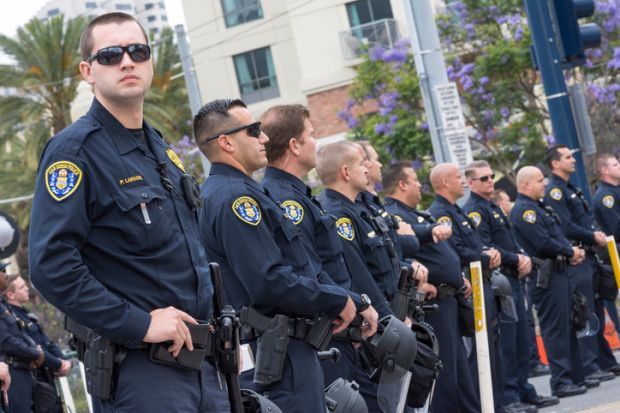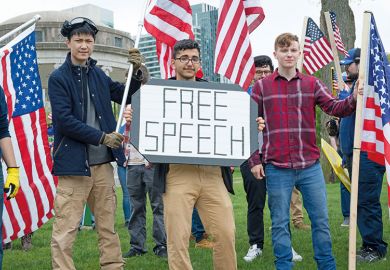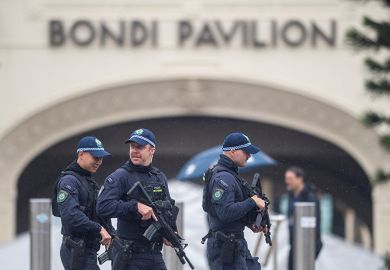If US university leaders had any hope that speaker disruptions and free speech disputes would be last term’s news, they have seen otherwise in the early weeks of this academic year.
Just last week, students shouted down talks at Columbia University and the University of Michigan. Those doing the shouting down were generally students aligned with the political left, but supporters of President Trump also shut down a talk at Whittier College by California’s attorney general, Xavier Becerra, shouting "America First" and "build that wall" to prevent him from answering questions. And those events followed the interruption of speakers (sometimes preventing events from taking place at all) at the College of William & Mary, Texas Southern University, the University of Oregon and Virginia Tech.
With these events becoming increasingly common, The University of Chicago invited presidents and provosts from a range of institutions to come to campus last weekend for a closed-door discussion on how higher education should respond. The University of Chicago has stated in a series of statements from its leaders and monographs on its history that free expression must be respected on campuses, no matter how controversial the idea being expressed.
While the meeting at Chicago was closed to the press, organisers arranged for a group of presidents and provosts to discuss what happened and the ideas that had engaged the college leaders. Daniel Diermeier, Chicago's provost, said that the university wanted a group large enough to have different kinds of institutions represented, but small enough for intense interaction among participants. Sixty-six presidents and provosts were there.
Professor Diermeier and other participants said the presidents were in strong agreement with principles of free speech, without exceptions. "Those principles apply irrespective of the ideological perspective of the speakers," he said.
But at the same time, some participants said that they wanted to work (and hope to have future meetings along these lines) on such issues as educating students on the First Amendment and also trying to change the narrative popular in the press that today's students are uniquely unable, compared with past generations, to deal with ideas that make them uncomfortable.
“One point that we’re not all in agreement on, but that I feel strongly about, is that [pundits and politicians have] tainted a group of students as being less resilient, as snowflakes," said Ana Mari Cauce, president of the University of Washington. "The student of today traverses a more diverse environment, with more perspectives, than a Yale student of the '20s who went to school with a valet and didn't have to confront real difference."
At the same time, Professor Cauce said, colleges need to focus more on education of their students on the values of free expression, especially in light of the experiences today's students have had with the First Amendment.
"Many of us thought there is a need for more education of our student body, for them to have a better understanding of why the First Amendment is so important," she said. "They have seen the First Amendment used to defend racism, sexism, etc. They don’t have the real understanding that the First Amendment has been used to defend minority views."
Likewise, she said it was important to recognise that some of those claiming to be First Amendment defenders may not be.
When far-right speakers regularly engage in "doxing" – sharing private information about some scholars with the public in ways that encourage harassment of those scholars – they are trying to shut down speech, Professor Cauce said. Of talks with more insults than ideas, Professor Cauce said that "they are not attempting to engage in real debate".
At the University of Washington, Professor Cauce defended the right of Milo Yiannopoulos to appear, citing principles of free expression, even as many asked her to call off the event. But she also made a point in her statements of questioning not only his views, but whether he was engaged in true discourse.
The idea that presidents need to do more than just lecture about the First Amendment was a common theme among the presidents, who said that they need to show empathy with those who feel betrayed by having certain speakers appear. Presidents and provosts stressed that they could (and should) simultaneously talk about why these speakers are so offensive, while also defending their right to appear.
"We also talked through a series of scenarios where we find it logical that many students might find a particular speaker highly offensive. And we want to let them know we understand that feeling," said Todd A. Diacon, provost of Kent State University.
At the Yiannopoulos event at the University of Washington, a man was shot. A Yiannopoulos event at the University of California, Berkeley, attracted anarchist protesters who vandalised the campus. Controlling the event at the University of Washington involved 124 police officers, a mix of those from the university and from Seattle. Berkeley spent hundreds of thousands of dollars on security last month for appearances by conservative speakers (and announced appearances by speakers who didn't show up).
The University of Florida is estimating that an appearance by white supremacist Richard Spencer will cost $500,000 (£377,000) in security expenses.
Several presidents said that the issue of security is one that needs to be addressed. Professor Cauce noted that many of those protesting – sometimes in illegal ways – are not students or otherwise connected to the university. As a result, she said it was appropriate that local police forces share responsibility, as happened at her campus.
Walter Kimbrough, president of Louisiana’s Dillard University, said he was concerned about the ability of speakers like Mr Spencer to return to the same campus – citing First Amendment principles – time after time, potentially forcing a campus to spend millions of dollars.
This is an edited version of a story which first appeared on Inside Higher Ed.
Register to continue
Why register?
- Registration is free and only takes a moment
- Once registered, you can read 3 articles a month
- Sign up for our newsletter
Subscribe
Or subscribe for unlimited access to:
- Unlimited access to news, views, insights & reviews
- Digital editions
- Digital access to THE’s university and college rankings analysis
Already registered or a current subscriber?







